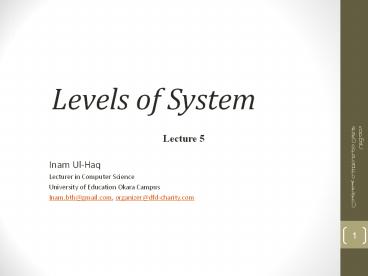Levels of System - PowerPoint PPT Presentation
Title:
Levels of System
Description:
Lecture 5 – PowerPoint PPT presentation
Number of Views:184
Title: Levels of System
1
Levels of System
Lecture 5
- Inam Ul-Haq
- Lecturer in Computer Science
- University of Education Okara Campus
- Inam.bth_at_gmail.com, organizer_at_dfd-charity.com
2
Organisation Hierarchy
- A hierarchy (say higher arky) is an arrangement
where there are different levels of authority or
power. - Organisations usually have a hierarchical
structure, where some people are more powerful or
important than others.
3
Typical hierarchy in organisations
4
Typical hierarchy in organisations
STRATEGIC
5
Typical management hierarchy in organisations
STRATEGIC
STRATEGIC
TACTICAL
6
Typical management hierarchy in organisations
STRATEGIC
STRATEGIC
TACTICAL
OPERATIONAL
7
STRATEGIC DECISION MAKERS
- The very highest level of the hierarchy
- Make very big decisions that
- Must consider the whole organisation, not just
part of it - Are expensive
- Are long-term (e.g. years)
- Could be disastrous if wrong
- Define the nature of the organisation
- Changes the organisations future
8
STRATEGIC DECISION MAKERS
- Typical Strategic level job titles
- Chairman
- President
- CEO (Chief Executive Office)
- Board of Directors
- General Manager
9
Tactical Management
- These people are still high-level, and make
important decisions in their own areas - But they follow instructions from above from the
strategic management. - Tactical managers implement the decisions made at
the strategic level. - They take a big idea and work out how to make it
happen - Their decisions are usually limited to a sector
of the org (e.g. advertising, transport) rather
than the whole org. - Project management is mostly tactical except
planning
Google it Tactical Management
10
Typical Tactical-Level Job Titles
- Advertising manager
- Personnel manager
- Creative director
- Manager of information systems
- Communications director
- Chief Financial Officer
11
Tactical decisions
- Implement strategic decisions
- Are medium-term (e.g. months, weeks)
- Are passed down to the next level of management
12
Operational Management
- Operational managers directly manage
non-management staff and the public. - They make day-to-day decisions that are vital to
actually make things, sell things, provide
services. - They are at the coal face doing business and
making money.
Google it Operational Management
13
Typical operational job titles
- Store manager
- Foreman
- Army Sergeant
Google what about IS?
14
Example
- Super-shop, a country wide chain of grocery
stores wants to increase its profit. - The board of directors discusses how to best
achieve this. - They decide they will move into the pharmacy
sector and include chemist shops in their stores. - This is a big departure from their usual
business. Its a strategic decision.
15
Tactical
- The directors instruct the tactical managers to
implement the decision. - The personnel manager advertises for pharmacists
to be employed. - The publicity manager plans a TV newspaper
campaign to advertise the change. - The facilities manager puts out tenders for the
construction work needed.
16
Operational
- The builders arrive at a local supermarket.
- The supermarket manager instructs staff to
reorganise shelving to allow the construction of
the pharmacy. - The manager chooses and arranges training for
staff who will be working in the pharmacy.
17
Non-management
- Cheryl, the checkout chick, empties out the
shelves where the pharmacy will be built. - Her decision-making is limited to Ill need to
get a trolley to take these cans to the other
shelves.
18
Drawing the line
- Sometimes its hard to decide whether a decision
is strategic, tactical or operational. - It can depend on the size of the organisation.
19
Drawing the line
- Judge whether the decision will have a
significant impact on the organisation over quite
some time. That would be strategic. - If the decision is made to implement a decision
made by a higher-ranking person (but it doesnt
actually achieve the end by itelf), its
tactical. - If a decision actually leads workers to doing
something that makes the plan work, its
operational.
20
Thanks to
- Thanks to
- Mark Kelly
- mark_at_vceit.com
- vceit.com
These slideshows may be freely used, modified or
distributed by teachers and students anywhere on
the planet (but not elsewhere). They may NOT be
sold. They must NOT be redistributed if you
modify them.































